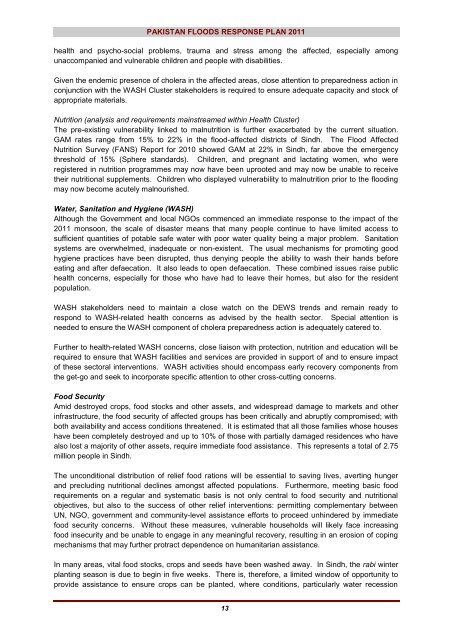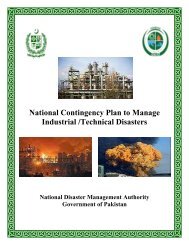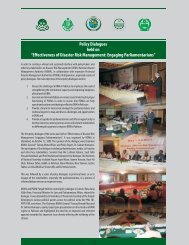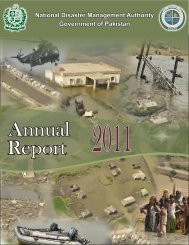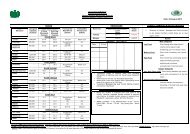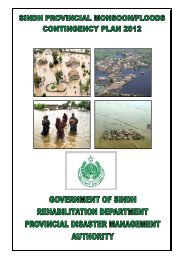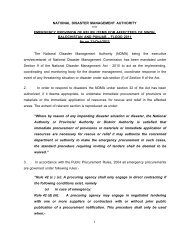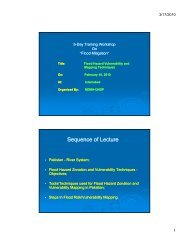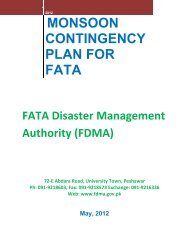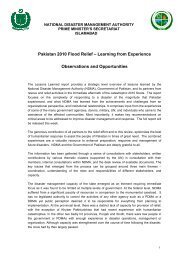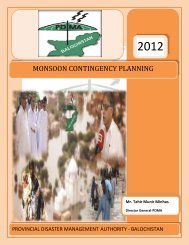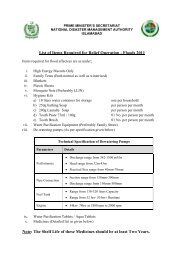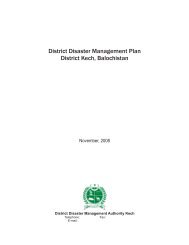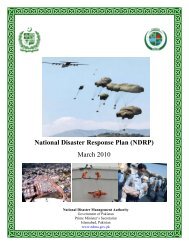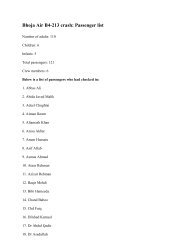Pakistan Floods 2011 - Humanitarian Response
Pakistan Floods 2011 - Humanitarian Response
Pakistan Floods 2011 - Humanitarian Response
- No tags were found...
Create successful ePaper yourself
Turn your PDF publications into a flip-book with our unique Google optimized e-Paper software.
PAKISTAN FLOODS RESPONSE PLAN <strong>2011</strong>health and psycho-social problems, trauma and stress among the affected, especially amongunaccompanied and vulnerable children and people with disabilities.Given the endemic presence of cholera in the affected areas, close attention to preparedness action inconjunction with the WASH Cluster stakeholders is required to ensure adequate capacity and stock ofappropriate materials.Nutrition (analysis and requirements mainstreamed within Health Cluster)The pre-existing vulnerability linked to malnutrition is further exacerbated by the current situation.GAM rates range from 15% to 22% in the flood-affected districts of Sindh. The Flood AffectedNutrition Survey (FANS) Report for 2010 showed GAM at 22% in Sindh, far above the emergencythreshold of 15% (Sphere standards). Children, and pregnant and lactating women, who wereregistered in nutrition programmes may now have been uprooted and may now be unable to receivetheir nutritional supplements. Children who displayed vulnerability to malnutrition prior to the floodingmay now become acutely malnourished.Water, Sanitation and Hygiene (WASH)Although the Government and local NGOs commenced an immediate response to the impact of the<strong>2011</strong> monsoon, the scale of disaster means that many people continue to have limited access tosufficient quantities of potable safe water with poor water quality being a major problem. Sanitationsystems are overwhelmed, inadequate or non-existent. The usual mechanisms for promoting goodhygiene practices have been disrupted, thus denying people the ability to wash their hands beforeeating and after defaecation. It also leads to open defaecation. These combined issues raise publichealth concerns, especially for those who have had to leave their homes, but also for the residentpopulation.WASH stakeholders need to maintain a close watch on the DEWS trends and remain ready torespond to WASH-related health concerns as advised by the health sector. Special attention isneeded to ensure the WASH component of cholera preparedness action is adequately catered to.Further to health-related WASH concerns, close liaison with protection, nutrition and education will berequired to ensure that WASH facilities and services are provided in support of and to ensure impactof these sectoral interventions. WASH activities should encompass early recovery components fromthe get-go and seek to incorporate specific attention to other cross-cutting concerns.Food SecurityAmid destroyed crops, food stocks and other assets, and widespread damage to markets and otherinfrastructure, the food security of affected groups has been critically and abruptly compromised; withboth availability and access conditions threatened. It is estimated that all those families whose houseshave been completely destroyed and up to 10% of those with partially damaged residences who havealso lost a majority of other assets, require immediate food assistance. This represents a total of 2.75million people in Sindh.The unconditional distribution of relief food rations will be essential to saving lives, averting hungerand precluding nutritional declines amongst affected populations. Furthermore, meeting basic foodrequirements on a regular and systematic basis is not only central to food security and nutritionalobjectives, but also to the success of other relief interventions: permitting complementary betweenUN, NGO, government and community-level assistance efforts to proceed unhindered by immediatefood security concerns. Without these measures, vulnerable households will likely face increasingfood insecurity and be unable to engage in any meaningful recovery, resulting in an erosion of copingmechanisms that may further protract dependence on humanitarian assistance.In many areas, vital food stocks, crops and seeds have been washed away. In Sindh, the rabi winterplanting season is due to begin in five weeks. There is, therefore, a limited window of opportunity toprovide assistance to ensure crops can be planted, where conditions, particularly water recession13


